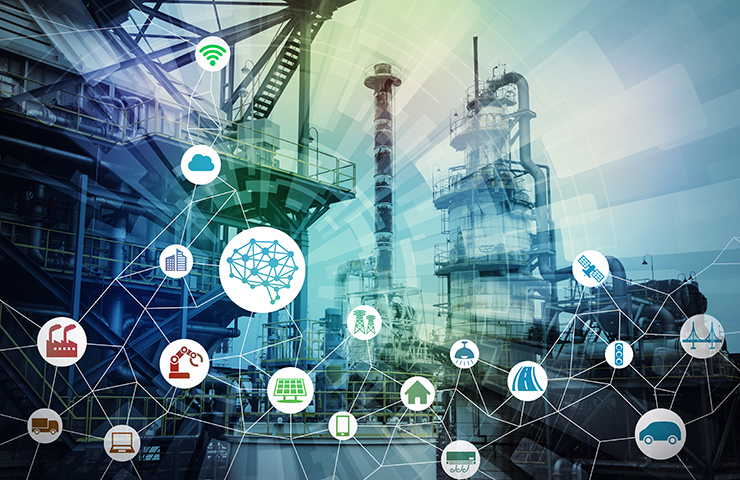Industrial parks and process plant operators are increasingly focusing on going digital

At the customer workshop of COSMO CONSULT TIC GmbH, which took place from 13 to 14 September at the Parkhotel Herrenkrug in Magdeburg, operators of large industrial parks, plant constructors and contractors learned about smart technologies. These technologies can be used in technical projects such as turnarounds, investment projects, and maintenance projects. Together with the Fraunhofer Institute for Factory Operation and Automation IFF and the technology partners specialized in sensors, Bosch and telent, the think tank of the COSMO CONSULT Group provided information on the various facets of the "Digital Construction Site" initiative. Discussions focused on the potential of going digital, the use of IoT technologies as well as data protection and data security.
Large industrial parks, such as refineries or chemical plants, are regularly shut down for inspection and maintenance purposes. However, each day of the standstill produces high costs, which is why operators of process plants keep these phases as short as possible. This is a challenge for project management, since all maintenance and repairs must be carried out in parallel in the brief window of time. For this to happen, the coordination of hundreds of contractors must be managed on the site every day. Until now unplanned waiting times were almost impossible to prevent. At the customer workshop of COSMO CONSULT TIC GmbH, existing customers, potential customers and developers discussed how smart technologies help to minimize unproductive times and limit time losses. Presentations by COSMO CONSULT, the technology partners Bosch and telent and the Fraunhofer IFF of Magdeburg gave the participants an overview of the current state-of-the-art of the technologies. The focus was on the "Digital Construction Site" initiative, a research and development project that optimizes and streamlines central processes using modern technologies - such as sensors, mobile devices or cloud-based portals - making them more transparent.
Using digital technologies to avoid idle times and minimize unproductive periods
Udo Ramin, managing director of COSMO CONSULT TIC GmbH, emphasized that digital transformation is not only about what happens on site: "A good example is the safety instructions usually given to all contractors when they enter the facility. The process can be done digitally before arrival. If safety checks are done online, you can avoid waiting times at check-in.” In this way, one of the largest refinery operators succeeded in significantly shortening the sometimes long lines at check in. The company is now using the cloud-based contractor portal not only for mobile safety, but also for other mobile apps. For example, gas measurements and releases of critical equipment are digitally documented and communicated in real time to the operator. The experiences have been consistently positive. In this way, the throughput times of central processes were shortened and unproductive periods were reduced. "This only works if the apps are easy to use, lean and exactly tailored to the task at hand," explains Ramin. Mobile apps help visualize core information, capture data, and track real-time processes. The necessary computing power comes from the cloud.
LoRa wireless standard ideal for digital construction sites
The afternoon belonged to sensors and tags. The COSMO CONSULT Group now has around 40 of these devices in its portfolio through its partners telent and Bosch. They measure temperature, vibrations and shocks, as well as relaying meter data or current location. However, not every sensor is suitable for use in industrial parks, emphasizes Viktor Kostic from telent GmbH: "The sensors have to be secure, cost-effective and energy-efficient. Furthermore, having long range, deep building penetration and a certain amount of resistance to interference signals is necessary." The LoRa (Long Range Wide Area) network is used for data transmission. It is a network specifically designed to meet the requirements of the "internet of things". The technology works over long ranges with extremely low energy consumption - even under difficult conditions such as when there are thick concrete walls.
Who owns the sensor data?
cc|object tracker records and tracks the notifications from the object sensors. The cloud service running on Microsoft Azure can forward the information to planning systems, such as ERP software of the operator or the equipment manufacturers. "Thanks to smart technologies, contractors are informed, for example, of where their machinery is currently located and to what extent the capacity is being fully utilized," emphasizes Benjamin Ochner of Robert Bosch GmbH. The most important point for the use of IoT components, as would quickly become clear in the final discussion, is and will remain the issue of security. The question of who owns the sensor data and who is allowed to use the information could not be determined with finality. The participants agreed that digital technologies will transform the processes of technical projects, such as shutdown management, in the coming years. Cloud solutions in particular meet the high requirements for data protection - provided the data are stored in highly secure German data centers such as the Azure Germany Cloud.
In the evening we switched to analog
The first day of the customer workshop ended with a visit to the guaranteed analogue engineering museum and dinner on the banks of the Elbe. On the second day, the focus was on topics such as business intelligence, Office 365 and a review of the practice projects of the digital construction site.
Tags
No tags available.